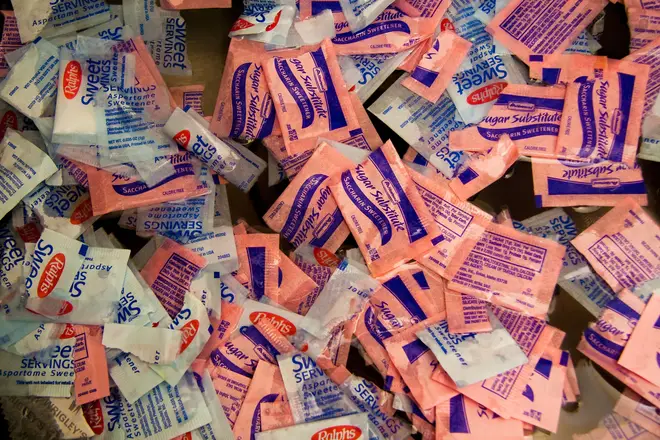
Iain Dale 10am - 1pm
8 September 2022, 11:09 | Updated: 8 September 2022, 11:55

Artificial sweeteners could be linked to heart and circulatory diseases and "should not be a considered a healthy and safe alternative to sugar", a major study has found.
The new study, published in the British Medical Journal (BMJ), examined health data for more than 100,000 adults from France.
Authors, led by experts from the Sorbonne Paris Nord University, looked at participants' consumption of sweeteners from all dietary sources including drinks and table-top sweeteners.
The researchers then followed them for an average of nine years and compared their risks of circulatory diseases.
Read more: Queen postpones Privy Council meeting after doctors advise her to rest
It was found that consumption of artificial sweeteners was linked to a 9 per cent higher risk of heart disease - when the blood supply to the heart is restricted or blocked.
When researchers looked more closely at specific illnesses, they found consuming artificial sweeteners was linked to an 18 per cent higher risk of cerebrovascular disease - conditions which specifically affect blood flow to the brain.
Researchers also looked at the impact of specific sweeteners.
Aspartame, one of the most commonly-used sweeteners in the UK that is found in many products including Diet Coke, was associated with a 17 per cent increased risk of strokes.
Acesulfame potassium and sucralose - both common sweeteners in the UK - were particularly associated with an increased risk of coronary heart disease.
Read more: Lewis Capaldi reveals he has Tourette's and says diagnosis makes 'so much sense'
The authors said the findings suggested a "modifiable risk factor" for preventing cardiovascular disease, and said they indicated "these food additives, consumed daily by millions of people and present in thousands of foods and beverages, should not be considered a healthy and safe alternative to sugar" - as they are currently.
Tracy Parker, senior dietitian at the British Heart Foundation (BHF), said that, whilst the findings only showed association and not a direct link, it is "a good idea to look at the amount of" sweeteners you are consuming.
She recommended swapping fizzy drinks for water and increasing your intake of foods known to be beneficial to heart health - such as fruit, vegetables and wholegrains.

Health Secretary says changes need to be made to the NHS quickly
The participants in the study had an average age of 42, and four out of five were female.
They noted everything they ate, including which brand was used, for 24 hours, with the diet diary repeated three times at six month intervals - twice on week days and once on a weekend day.
Thirty-seven per cent of participants consumed artificial sweeteners.
During an average follow-up period of nine years, 1,502 cardiovascular events were recorded by participants.
This included heart attacks, stokes, transient ischemic attacks (also known as mini strokes) and angina - chest pain linked to poor blood flow to heart muscles.
Read more: Ex England footballer jailed over plot to smuggle 24kgs of cannabis
The authors wrote: "In this large-scale, prospective cohort of French adults, artificial sweeteners (especially aspartame, acesulfame potassium and sucralose) were associated with increased risk of cardiovascular, cerebrovascular and coronary heart diseases."
They went on: "The results suggest that artificial sweeteners might represent a modifiable risk factor for cardiovascular disease prevention.
"The findings indicate that these food additives, consumed daily by millions of people and present in thousands of foods and beverages, should not be considered a healthy and safe alternative to sugar, in line with the current position of several health agencies."

Ms Parker from the BHF said: "Observational studies like these can only show an association, and more research is needed to understand the links between artificial sweeteners and the risk of developing heart and circulatory diseases.
"Most adults in the UK eat too much sugar, and this is linked to health problems such as obesity and tooth decay.
"Artificial sweeteners are an attractive way to reduce sugar intake and before they can be added to food in Europe, the European Food Safety Agency (EFSA) has to approve their use. This is a rigorous process, so you can feel confident they are safe to eat.
"While these findings shouldn't cause undue concern, it's always a good idea to look at the amount of sugar and sweeteners in your diet. Try to swap fizzy drinks for water and increase your intake of heart healthy foods, like lentils, nuts and seeds, as well as fruit, vegetables and wholegrains."